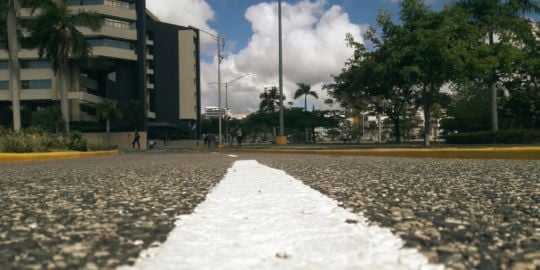What to buy and what to eat in the Dominican Republic

It is well worth exploring the Dominican cuisine and shopping options, and note what they buy and where they shop, as it is significantly cheaper than relying on imported goods, which are not always available across the whole island.
Food in the Dominican Republic
Dominican food is usually cooked in a lot of vegetable oil, salt, and is not generally spicy. The main flavouring used is cilantro or coriander, with oregano as well.
The staple Dominican diet is rice, beans, and stewed meat ' usually chicken. This is called La Bandera which means the flag and is the national dish. Dominicans have their main meal at noon, on the dot, and this is what they will normally eat, accompanied by a salad or avocado when in season. Another favourite meal is mangú, which is mashed plantain bananas served with fried salami or a smoked pork chop. Often mangú is served for breakfast with a fried egg, fried salami, and fried cheese. Fried chicken with plantain chips, called tostones is another favourite meal.
Dominican vegetables
Apart from imported vegetables which are available at international supermarkets, the range of vegetables available is the same most of the year. Plantains and smaller green bananas, known as guineo, along with potatoes, yuca, yam, and other root vegetables, are used in a stew called san cocho which is often consumed at weddings and other celebrations. San cocho also has meat in the dish, usually beef or pork and a lot of cilantro. The perfect san cocho actually has seven different types of meat.
You can easily find vegetables such as cabbage, beets, lettuce, tomatoes, cucumber, spring onions and celery, as well as herbs such as cilantro and parsley. You can also find broccoli, carrots, chayote, okra and aubergine (eggplant), along with green and red peppers, garlic and onions. The only peas available are pigeon peas, when in season, and there are occasionally long green beans. There are all sorts of beans; red, black, white, and pinto which need soaking overnight. But there are no sprouts, no parsnips, no sweet green peas, no swede, no mushrooms, and no new potatoes readily available.
Dominican meat and fish
The standard meat is chicken which is available everywhere, and pork is often available too. The beef is very tough but works in stews as long as it is cooked for at least three hours, but it is hard to find juicy rump or fillet steak ' unless imported. Lamb is rarely available as well, but on special occasions, goat is eaten in a stew.
Fish and seafood are plentiful on the coast and usually delicious, especially if grilled on an open fire.
Where to eat out
There is a wide variety of places to eat. Dominican street food is mostly fried and there are stands selling empanadas (deep fried wraps containing cheese, chicken, salami), fried yucca balls, and kippes (similar to falafels), as well as chicken.
Then there are what are called colmadons, which are like cafeterias, with plastic tables and chairs for seating, and food served from large heated trays. There is always rice, beans, and stewed chicken pork or beef available, and a meal will cost around US$4.
Many beaches have shacks selling fried fish and chicken, and that is always great value and a lovely way to spend the day.
There is also a whole range of restaurants, often run by expats, around the country which offer food from almost every nation in the world, including Italian, Spanish, British pub food, Chinese, Japanese, Lebanese, etc. There are quite a lot of options. The main cities of Santo Domingo and Santiago have the largest choice, along with the main tourist and expat areas of Sosuá and Cabarete, Las Terrenas, Punta Cana, and Bávaro.
What to avoid
You cannot drink the tap water so all water has to be bought in five-gallon bottles. It is not wise to eat salads when you are out if you are concerned about whether it has been washed in tap water or with clean boiled or bottled water. Most other things are fine to eat, but watch out for undercooked pork or chicken ' especially if it has been barbecued.
Where to shop for food
There are international supermarkets in all major expat and tourist areas and the major cities. Apart from that, there are regular Dominican supermarkets with a much smaller range, and very few imported items, whereas the international supermarkets have a wide range of imported meat, cheese, cold cuts and tinned and bottled items.
Many Dominicans shop in local corner shops which are known as colmados. The word literally means stuffed to the brim and they are full of staples such as rice, beans, chicken, salami, milk, eggs, juice, beer, rum, etc. Most offer credit and most also offer a delivery service. They also sell many items in tiny packages or sachets as many Dominicans do not have a fridge.
All towns have markets, which are great places to buy the freshest fruits and vegetables, and there are also trucks which drive around piled high with fruits and vegetables.
Where to shop for electrical and household goods
Most of the large supermarkets have a wide range of electrical products and household goods such as Jumbo, La Sirena, Nacional, and Plaza Lama. You should be aware that many of these types of goods have been rejected from their home country due to sub-standard manufacture so are not of the same quality, and the guarantee is often stamped 'Null and Void'. For high quality electrical and household goods, it is often better to import them.
Shopping for clothes
Clothes are available everywhere, but plus size clothing can be hard to find. The big malls in the cities have brand name stores, but elsewhere most of the clothing is cheaper and often does not last very long.
How to import goods
You can import goods from overseas, and there is no import tax or duty for items ordered online below US$200. Above that figure, you have to pay import tax which varies depending on the type of product and its value. Most expats have a PO Box in Miami and a freight forwarder sends their goods from there to the Dominican Republic.
Useful links:
Dominican Customs
Dominican Recipes
La Sirena supermarket
El Nacional and Jumbo supermarkets
Plaza Lama









